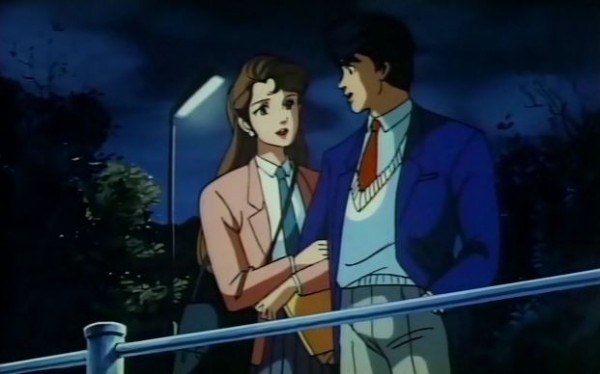 |
From https://images-na.ssl-images-amazon.com
/images/I/61rGbDkHpoL._SY445_.jpg |
Directors: Various
Screenplay: Yoji Fukuyama, Hideki
Futamura, Shôji Kawamori, Mitsuyoshi Takasu, Masaaki Yuasa
Voice Cast: Tomoko Kaneda, Rinko
Kikuchi, Kaoru Mizuhara, Lu Ningjuan, Taro Yabe, Yûya Yagira
Viewed in Japanese with English Subtitles
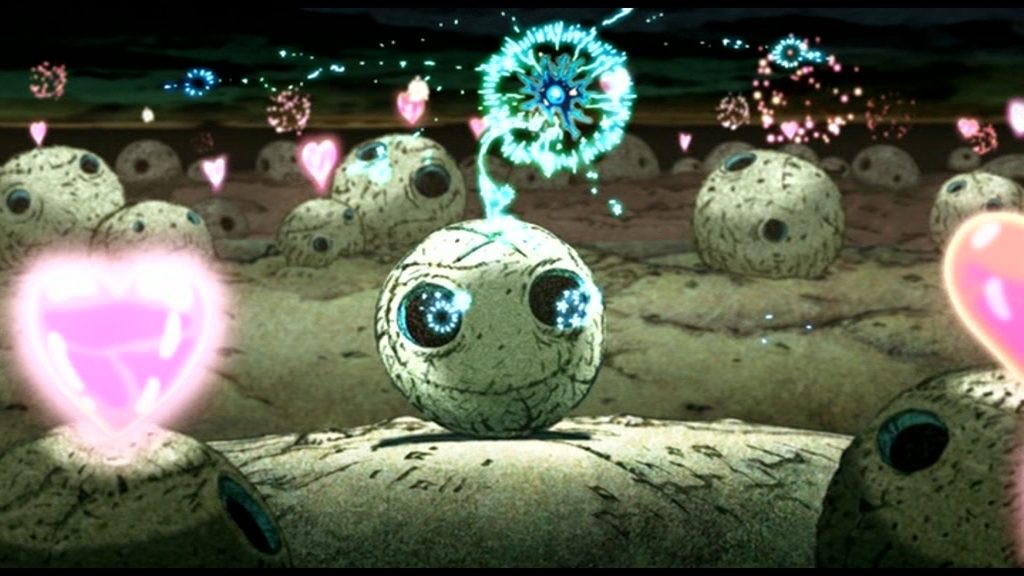 |
From https://cdn.animeuknews.net/app/uploads
/2017/12/Genius-Party-2-1-1024x576.jpg |
Genius Party:
Director: Atsuko Fukushima
Known for their innovative,
idiosyncratic animation you can forgive Studio
4°C for both creating two anthologies released over two years and calling
them both "Genius Party". Befittingly the first segment by Atsuko Fukushima is also called Genius Party.
In a strange sci-fi desert, a
birdman finds a living sphere with a soul heart attached to it, leading to a
giddy enlightenment where all those involved (including the sphere and its peers)
transform in an animation enthusiast's wet dream. Naturally it leads to these
creatures inventing cinema, which is hilarious and acts as a long but perfect
introduction for any anthology, only matched by Katsuhiro Otomo's humorously misanthropic bookends with added
explosions for Robot Carnival (1987).
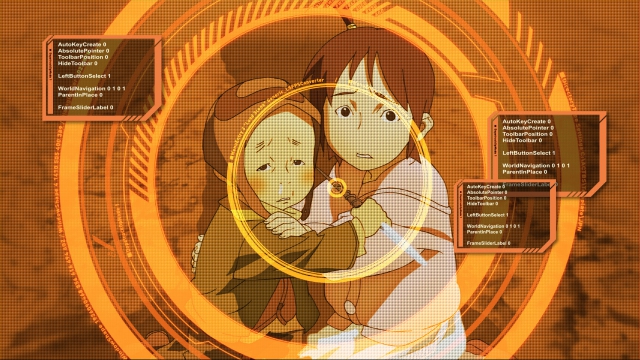 |
From https://jfdb.jp/data/photo/movie/bb/de/d3/
85/9ea3cc44b7ab386859941dd62473a417_640.jpg |
Shanghai Dreams:
Director: Shoji Kawamori
Shanghai Dreams, from this beginning, splits Genius Party between two action heavy tales at the start before
they become more introspective. Kawamori
is definitely a genius before anyone asks, the legendary mecha designer/anime
director/screenwriter/visual artist starting whilst a teenager in the industry,
and among the anecdotes to him the kind of man at an anime panel in the US
gladly demonstrating his craft by bringing intricate versions of his designs
made out of Lego as tangible examples. He can also claim, among a large career
CV, being the original creator of The
Vision of Escaflowne (1996) and being involved with all the legendary Macross franchise baring Macross II (1992).
He decided to set a story in a
present day China, with two languages including Japanese used, and envisions an
alien invasion that can only be stopped by a distractible five year old boy
given the ability to make his imagination real. Its befitting I mentioned Kawamori as someone with a healthy
creativity, because it feels like a personal side is being shown here even if
this premise doesn't go as you'd expect, a nice anti-climax with humour because
giving a very young boy who interested in flights of fantasy isn't necessary
the person expected to stop actual alien machinery. It does instead turn into a
sweet ode to childhood imagination where the two soldiers from the future
involved, with the their cybernetic bodies and guns, sympathise with the boy
and the smarter young girl after it all blows over, lamenting and celebrating
the idea of imagination that children are capable. Its arguably is one of the
best shorts in a strong anthology, both as a sumptuous visual feast and feeling
like a sincere creation from a very well regarded veteran.
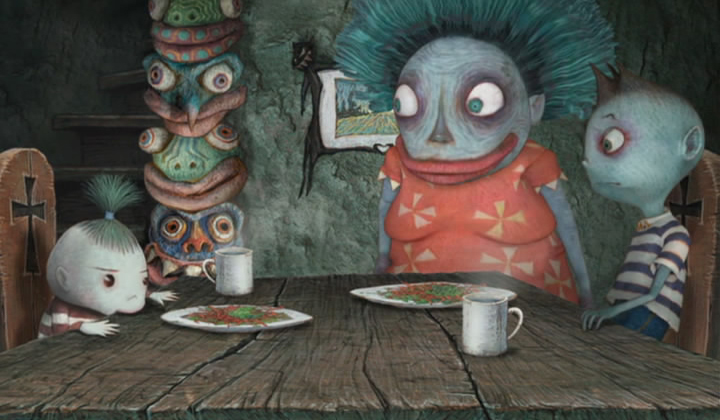 |
From https://guriguriblog.files.wordpress.com/2010/02/bss_
genius_party_-_deathtic_4_dbe77e84-mkv_snapshot_01-06_2010-01-19_03-34-52.jpg |
Deathtic 4:
Director: Shinji Kimura
Deathtic 4 shows us the world of the undead, where a young ghoul
with a trio of super powered but thankless boys attempts attempt to take a living
frog back to its world. Its idiosyncratic aesthetic stands out, alongside again
being a kinetic short which emphasises a cleverness to action in giving it
vibrancy and making every short count as its animated, not always found in live
action. The aesthetic details given also invoke a living world with its own
logic you wish you could see more of, just for the police force who are the
show stealers of the segment, literal person sized balloons who use peddle
bikes with bells as their pursuit vehicles.
 |
| From https://antiotaku.files.wordpress.com/2010/08/geniusparty042.png |
Doorbell:
Director: Yoji Fukuyama
Doorbell as with the last segment, whilst they have grown in
admiration, do have the unfortunate place of being the most conventional films
to an anthology that mainly pushes for very unconventional art styles and
structures within them in comparison. However, that's not necessarily a bad
thing as Doorbell to its credit, in
which a young male is cursed by a doppelganger that, when they reach a person's
door first, leaves him an invisible spectre wandering the streets, is still an
immensely engaging tale. Its neither merely metaphysical or supernatural, just
a very open minded and curious tale open to interpretation whose more
conventional art style, bright and calm, is helpful in making sure its tale and
emotional depth is of priority.
 |
| From http://1.bp.blogspot.com/-p_5YOLNLnHM/T3pVvSFdVFI/AAAAAAAAAJ0/NqUFm10sKsg/s1600/%5BBSS%5D_Genius_Party_-_Limit_Cycle_%5B79563821%5D%5B13-12-22%5D.JPG |
Limit Cycle:
Director: Hideki Futamura
Out of all the Genius Party, Futamura's segment is going to be the most divisive. Following a James Dean lookalike, this is a
religious/spiritual mosaic in moving form, his life in a futuristic city a
deadbeat job, blurred figures passing by and wanton sex with women as he
searches for the truth of his existence. With a narrator talking of existential
ideas in an oblique way, and with real religious and alchemical symbols and
drawings onscreen, Limit Cycle could
turn people off easily.
It asks, if you know exactly what
everything used or spoken of means, whether it has actual depth or not, but an
obvious problem is that religion and especially the alchemist material is
subject matter not talked about by many unless you're a scholar (amateur or
professional) of this material. It's clearly more deliberate than most anime
and with a point, not like the notorious fact that, for all its depth, the Neon Genesis Evangelion franchise just
used Christian and Judaic references just to look cool. Helping Limit Cycle is that, connecting the
images together, it has a cognisant and easy to follow plot - one man finds his
spiritual other half, his soul, and then finds God.
The monologue and the symbolism
(including the Jewish symbol of the Tree of Life Evangelion has used itself) needs to be decoded, alongside the real
life figure God himself is clearly designed as, in particularly as Alchemy is a
very unconventional and fascinating choice to have referred; viewed in
stereotype as men trying to turn base materials into gold, which many actually
tried, it has however been interpreted especially with the Hermetic philosophy
(based on the figure who dubbed himself Hermes who influenced alchemy over
centuries) to clearly have a spiritual meaning, the transformation to gold a person's
spirit rather than a base wealth. That kind of reference doesn't get used a
lot, or properly to the actual source materials, so in the middle of Genius Party it's a curious and
divisive choice to have done. Because I have some knowledge of this type of
material, I'll confess to being the who admires Limit Cycle especially as it's still a visual feast, helped by its
New Age score, whilst also recommending viewers to take the segment with a
pinch of salt, particularly as I'd argue the narration more than the visual
content is the aspect people will struggle with more.
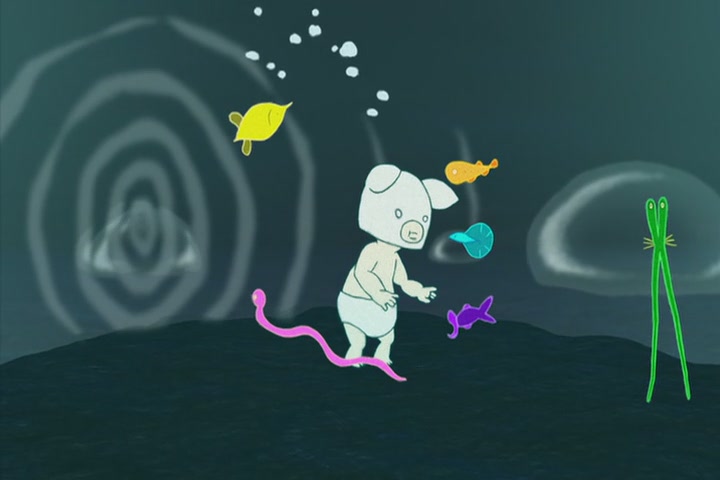 |
From http://2.bp.blogspot.com/_eNuuX3apRtE/TSTZLiPpXDI/AAAAAAAAFFE/
0UQTsZ508sE/s1600/Genius%2BParty%2B-%2BHappy%2BMachine_1.JPG |
Happy Machine:
Director: Masaaki Yuasa
After the divisiveness of Limit Cycle, trust Studio 4°C's genius Masaaki
Yuasa to steal the entire anthology with Happy Machine, so visibly a metaphor of life and death in a curious
tale of a baby who, raised in an artificial nursery with a robot wet nurse,
then wanders the alien desert outside and encounters various creatures, all
until a circle of life analogy takes place without the Elton John score from The Lion
King (1994) being required.
Yuasa's style is clearly his own, but it is difficult to pinpoint
why in clear precise detail despite all the work being visibly categorisable as
his - he is referenced in lieu of the Superflat movement, and takes styles like
cartoon exaggeration and using images of real people for characters amongst his
many other idiosyncrasies. The influences he's opened up about (like Yellow Submarine (1968)) are visible in
his world here, one with a beloved plant creature who eats all waste alongside
denizens who could have cameoed in René
Laloux's Fantastic Planet (1973).
It stands tall as the best of Genius
Party, a tale of a bitter sweetness nonetheless also with gleeful
eccentricity that has always been his best trait as a director, someone whose
work is legitimately adult in its emotional spectrum but playfully weird. Happy Machine also feels like it was
made without breaking a sweat on his part, adding to the aura around him.
 |
From https://goboiano.com/wp-content/uploads/2017/
08/Genius-Party-Baby-Blue.jpg |
Baby Blue:
Director: Shinichiro Watanabe
In lieu of this, Cowboy Bebop director Shinichiro Watanabe's Baby Blue is unfairly forced to follow it and to end a strong line-up for the
entire anthology. It's still a good segment, and in vast contrast to my
original review I've grown fonder to it as a result, in which a boy and a girl
decide to skip school and travel to a far off beach one day, one in the
territory of naturalistic drama.
There is a mountain to climb with
a premise like Baby Blue's in lieu
to Makoto Shinkai making this type of
subject his domain, and high school being a pathological obsession of anime in
general nowadays, but it helps Watanabe's
is a sweet hearted tale, one with some eccentricity to be allowed in which
there's a subplot about a hand grenade of all things, something that in a tale
of two people who love each other but are to depart definitely gives this
domestic tale an edge with how that goes. It's modesty was what I originally
(and unfairly) dismissed it with, when in reality it ends what was an anthology
that was for too long difficult to see and now has been a worthwhile experience
to finally see.










